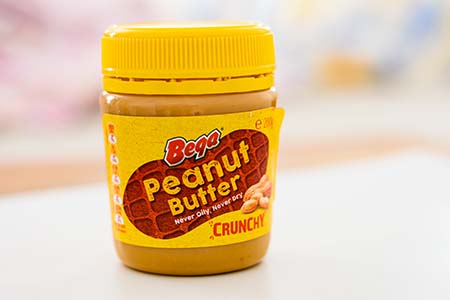Peanut butter is a paste or spread made from ground dry-roasted peanuts and is a popular food in many countries. It often contains additional ingredients that modify the taste or texture, such as sugar, chocolate, and emulsifiers.
Some foods can cause constipation and indigestion. Peanut butter doesn’t seem to fall into that category of foods.

Peanut butter is loaded with lots of nutrients including protein, fat, vitamins and minerals. It also has a significant amount of dietary fiber that helps relieve constipation.
Peanut butter doesn’t cause constipation. You can add peanut butter in your diet without the fear of constipation. Spread it on whole-grain bread to make it healthier.
Although peanut butter is high in many healthy vitamins and minerals, it also contains a substantial amount of saturated fat and calories. If you are trying to lose weight, peanut butter is not a good choice, instead, you need to eat more fresh vegetables.
Some people have a severe allergy to peanuts. Those people should never eat peanut butter or other products that contain peanuts.
Peanut butter is high in fat and calories, with one tablespoon containing around 110 calories. However, peanuts contain mostly unsaturated fats, that are good for your body. It contains some saturated fats, but one tablespoon contains only around 5% of an adult’s recommended daily saturated fat intake.
Peanut butter is also a good source of vegetarian protein. It contains an array of minerals including magnesium, iron, and zinc, as well as the B vitamins and vitamin E.
The best peanut butter varieties to buy are those that have a higher percentage of peanuts as possible. Check the ingredients label before you buy, many brands add extra ingredients such as oil, sugar, and salt to enhance the flavor. These additives change the nutritional profile of the product. Some products which are marketed as ‘reduced fat’ may have added sugar to help them taste good.
There are some different blends of peanut butter available on the market such as coconut and peanut butter, or blends that include pumpkin and sunflower seeds. This can be a tasty variation to try, but again, check the labels to make sure that they don’t contain extra salts, sugars or preservatives in order to make the healthiest choice.
Numerous studies have shown that people who regularly include nuts or peanut butter in their diets are less likely to develop heart disease or type 2 diabetes than those who rarely eat nuts.
Bottom line:
Peanut butter is a healthy food that can be included in your diet with other healthy foods. It does not cause constipation or other bowel problems if you consume it correctly.